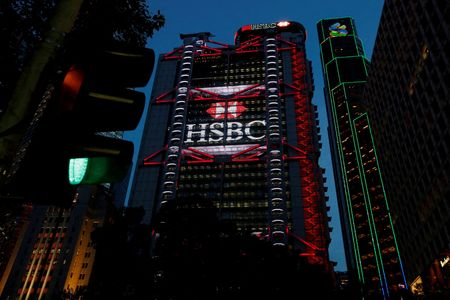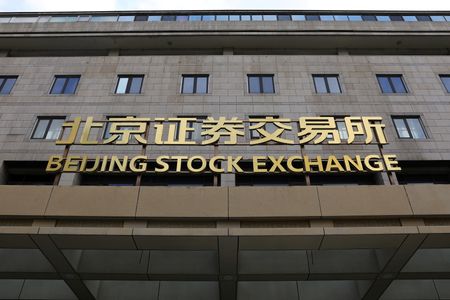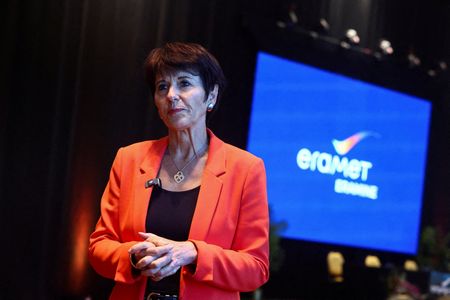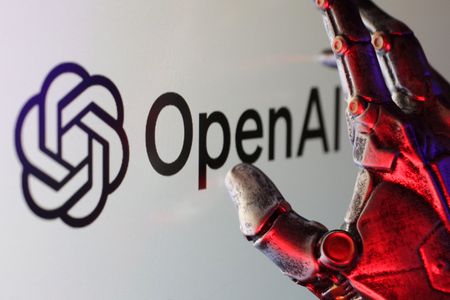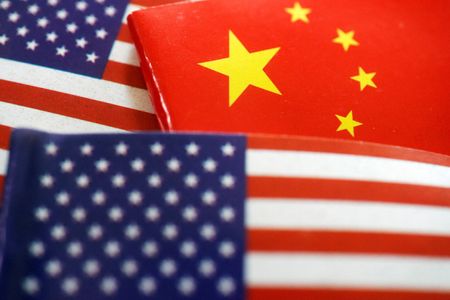By Selena Li and Sumeet Chatterjee
HONG KONG (Reuters) – HSBC expects to incur $1.8 billion in expenses by the end of next year related to an overhaul initiated by its new CEO to cut long-term costs and boost profits while navigating diverging interest rate policies and geopolitical turmoil.
The Asia-focused lender booked earnings for 2024 that beat market expectations, announced a new $2 billion share buyback which it plans to complete before earnings filing in April, and retained forecast for a key performance target for three years.
A costly overhaul at a time when outlook for HSBC is muddied by different paths for global interest rate policies and rising geopolitical and economic uncertainties confronts CEO Georges Elhedery with a difficult balancing in the near-term.
Despite the profit beat and the buyback announcement, the bank’s shares posted muted gains on Wednesday. They closed up 0.3% in Hong Kong after having touched a new high since February 2011, and were down 0.3% in London.
Citigroup analysts said in a research note restructuring-related charges that HSBC expects to incur were heavier than expected, and could yet be larger still, thereby limiting scope for future share buybacks.
HSBC reported a 6.6% rise in 2024 pre-tax profit to $32.3 billion, moderately ahead of analysts average estimate of $31.7 billion, as income withstood the impact of falling interest rates.
The bank is aiming for about $300 million in cost reduction in 2025, with a commitment to an annualised reduction of $1.5 billion in cost base by the end of 2026, it said in its financial statement.
The move will, however, result in severance and other up-front expenses totalling $1.8 billion by end of next year.
“We do expect some of the savings to come from various areas of the bank, both in the business functions where we had duplications … or from the duplicated roles of the wholesale businesses that we brought together,” Elhedery said.
He said that a large part of the cost related to its biggest investment banking retrenchment in decades will be incurred this year.
HSBC said it aimed for a mid-teens percentage return on average tangible equity, a key performance target, for each year from 2025 to 2027, despite a volatile rate outlook.
Elhedery became HSBC CEO in September and has since been working to boost returns and intensify the London-headquartered bank’s focus on Asia, where it earns most of its revenues and profits.
COST-CUTTING MEASURES
HSBC’s headcount fell 3% last year and its staff bonus pool hardly changed from 2023 as Elhedery sharpened focus on costs, the bank also said on Wednesday.
Michael Makdad, senior market analyst at Morningstar, welcomed plans to trim personnel expenses by 8% over this year and next, but said there were no new eye-catching cost-cutting measures in the bank’s announcement.
“That’s not necessarily a bad thing – increasing efficiency at a bank like HSBC is a matter of many small and midsize details that have to be well coordinated,” Makdad said.
For 2024, wealth and personal banking, HSBC’s biggest earner, delivered $12.2 billion in profit, up 5.2% from a year earlier, as it won new customers and sold more wealth management products.
Elhedery said that the bank was looking to invest more to bolster its wealth business, especially in Asia. Profit in global banking and markets rose nearly 27% to $7.1 billion.
HSBC also said it will pay a fourth interim dividend of $0.36 a share, resulting in a total of $0.87 for 2024, which includes a special dividend of $0.21 for the disposal of its Canadian business.
Elhedery, a career HSBC insider promoted from the CFO role, has moved faster than some analysts and investors expected to shake up the bank by slashing the ranks of senior managers and reorganising operating divisions along East-West lines.
He cut the mergers-and-acquisitions and equity capital markets teams in Europe and the Americas last month, and said on Wednesday supporting roles related to those operations in Asia were expected to be impacted.
The biggest bank in Europe by assets also said on Wednesday it was pushing back its emissions-reduction goal to mid-century from 2030, joining other institutions and governments in dialling back on climate pledges.
(Reporting by Selena Li and Sumeet Chatterjee; Editing by Christopher Cushing and Tomasz Janowski)

